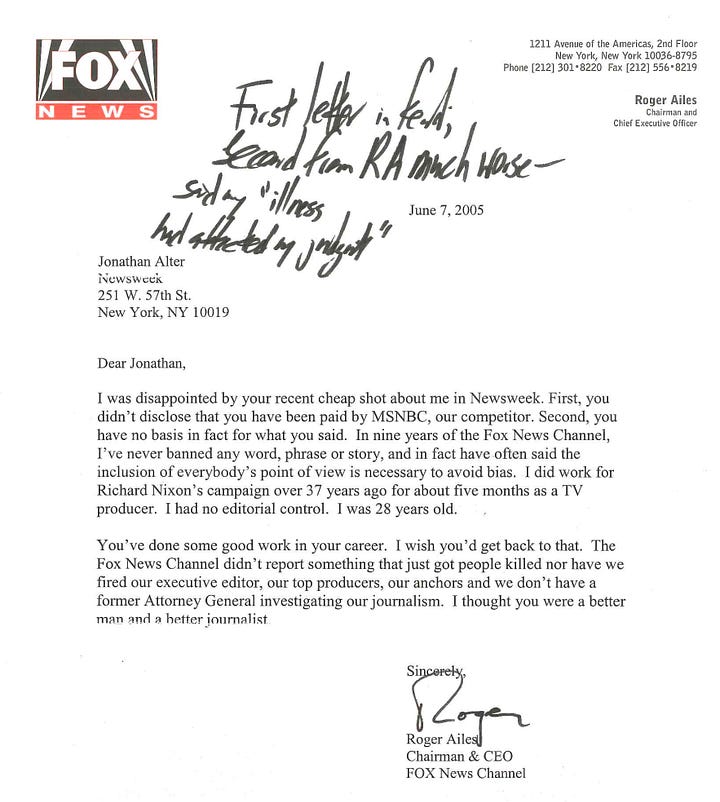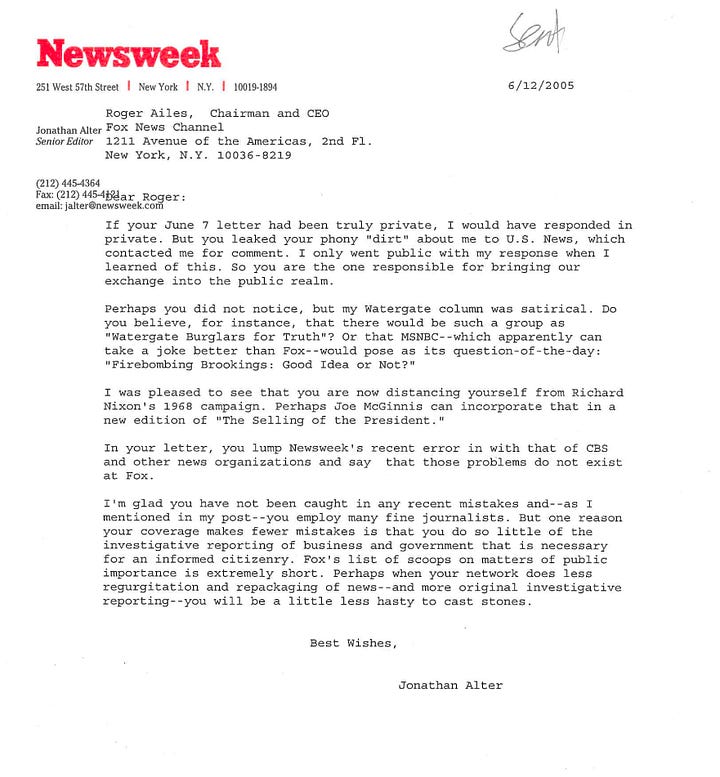Roger and Me: My Feud with Roger Ailes
A new Axios post takes me back to the Fox News chief’s epic nastiness
We hear it all the time: It didn’t start with Trump. And it’s true. On Capitol Hill, the Era of Lying Bullies started with Newt Gingrich; on the radio, with Rush Limbaugh; and on TV, with Roger Ailes.
I knew and wrote about all three, but my most memorable interactions were with Ailes. We actually had a long-standing feud, which Jim VandeHei, co-founder of both Politico and Axios, refers to this week in his Axios column with details about Ailes’ hatred of me that I never knew before.
The VandeHei column — which I’ll get to — has led me to tell a little story now about Ailes and me that I had never wanted to see published before. It’s a story with new evidence (as if we needed any) of how this man who helped wreck America was also a twisted and disgusting human being.
I’m telling it now because the passage of time has made it easier for me to discuss, and because Ailes is now a major historical figure. I hope it gives you a little insight into how Roger wielded power.
Roger and I started off on good terms. In 1993, he returned to television after a long career as a political consultant and became president of CNBC. Always the entrepreneur, he launched the spin-off channel America’s Talking, which three years later evolved into MSNBC. Going back to The Mike Douglas Show, which is where he was when he met Richard Nixon and became the central figure in Joe McGinniss’ classic, The Selling of the President 1968, Ailes was a behind-the-scenes producer. But as the boss at America’s Talking, he put himself on camera as the awkward and unappealing host of a short-lived hour-long talk show called Straight Forward. I was his guest two or three times before he left in 1996 to run (not start) Fox News Channel.
Fast forward to late 2000. My contract with NBC News was up and I was looking around. Roger invited me to his office (the same office where he would force women to turn around so he could see their rears), where he offered me a job for more pay. Even then, when Fox was relatively new and not so offensive, I had qualms, and Ailes’ job requirement was a deal-breaker: that a chyron appear below my picture on the screen that would label me “Liberal.” I realized he was looking for another liberal punching bag like the late Alan Colmes, who was then co-host of one of Fox’s most popular shows, Hannity and Colmes. I declined and ended up re-signing with NBC News, where I’ve remained to this day.
Five years later, when George W. Bush was president and Republicans controlled both houses of Congress, I wrote a tongue-in-cheek column in Newsweek entitled, “If Watergate Happened Now.” (Newsweek’s archive sucks, but I found the piece at this news aggregator site.) I argued that if the Watergate scandal had erupted in 2005, there would have been no explosive hearings and no impeachment, just Hannity and Matt Drudge trashing President Nixon’s critics and Bob Woodward and Carl Bernstein subpoenaed to reveal their sources. Ailes, I wrote, would have “banned the word ‘Watergate’ from Fox News coverage and [gone] with the logo ‘Assault on the Presidency’ instead.”
Roger was not amused, and he responded in typical Roger fashion: by trying to slime me. He and his venomous publicist, Irena Briganti, always had a few second-rate reporters from various print publications at their beck and call. One of them, from the Washington Whispers section of U.S. News and World Report (a Newsweek rival), called to ask my reaction to the charge that I was behaving unethically because I was required to disclose in my Newsweek column that I was a disappointed job seeker at Fox.
I knew that if I tried to explain myself, my point about Ailes wanting a leftwing patsy would never run and U.S. News would make me look guilty of a conflict of interest. So I opted for a different strategy. Having just survived a serious bout with cancer, I wasn’t afraid of Ailes. It would be too parochial to take him on in Newsweek, but I knew Arianna Huffington (who had consulted with me before launching the Huffington Post the year before) and called him out in Huffpo, telling readers “This is how Roger Ailes plays the game.”
Roger, enraged, wrote me one of his infamous poison pen letters, which I gleefully posted on Huffpo and landed a few more blows. But then I received a second letter from him containing a sentence that, less than two years out from being given a 50/50 chance of survival from Stage 4 lymphoma, chilled me to the bone:
“Jon, your illness has affected your judgment.”
Whoa. Didn’t see that one coming. Upset, I threw it in the circular file. I decided to call a cease-fire and told no one except my wife of this stunning insult, beneath contempt. I vowed I would never speak to Roger again and never did. A few years later, I let author Gabriel Sherman know about it off-the-record but resisted his pleas that I allow him to use the story in his book, which became a bestseller. I felt that if I had done so, many people would remember me just as that guy with cancer who was maligned by Roger Ailes. Now, I’m not worried about that anymore.


I’ve always believed, as the French say, that revenge is a dish best eaten cold. In 2013, Politico’s Dylan Byers got word of the scooplets in my book, The Center Holds: Obama and His Enemies. Ailes was an Obama enemy, and I had dug up quite a bit of unflattering stuff about him, thanks to former Fox News employees who were more than happy to share their stories of his paranoia (Unfortunately, none told me about the sexual harassment). Byers summarized what my book contained on this:
To wit: He "had a television monitor on his desk that showed video of the empty hall outside his office so that he would have warning if terrorists were coming to kill him," and once "demanded that security throw a 'Muslim-looking' man out of the building." (The man turned out to be a janitor.) He was "convinced that the whole News Corp. building was bugged" and thus worked out of a supply closet one day (according to Rupert Murdoch, his boss). And he once "tried to order bombproof glass for his office because he thought homosexuals outside News Corp. headquarters on Sixth Avenue might shoot at him."
Ailes also had "round-the-clock security guards outside the locked gates of his Putnam County, New York estate," "insist[s] on entering News Corp.'s headquarters through a side door used by no other executives, not even Murdoch," and has "two bodyguards" who escort him into the building.
Here’s how VandeHei, who was trying and failing to patch up Politico’s relationship with Ailes, last week recounted what happened next:
When Ailes came on the line, he was fuming about Byers' writeup of a book about President Obama by Jonathan Alter that portrayed Ailes as paranoid.
Ailes yelled at me about Alter "writing in his underwear," and how he would "not take any shit from Dylan," based on detailed notes I took for a diary of my time at Politico.
Ailes screamed: "I did not think he was an intellectual because that's what all you left-wing nuts think.”
My response, again thinking blunt force might work: "Roger, go f--- yourself."
Ailes died in 2017, so I guess I’ll never know why he thought I wrote in my underwear. My best guess is that he dimly recalled an anecdote connected to a blockbuster 1986 Newsweek interview I did with Bill Moyers, then a CBS News commentator, in which he attacked his employer. (The resulting story led to a management change at the top of CBS Inc. and my getting a one-on-one lunch with William Paley in his office). I later recounted to friends (and possibly Ailes) that Moyers had called me at home early in the morning to spill his guts and I had jotted notes as I sat on my couch in my underwear.
When my book was published, Ailes unloaded on me: “Jonathan Alter got 3 out of 13 items within a range of being at least partially correct,” Ailes told Politico. “The rest are patently, provably false and Alter either needs to check into a first year journalism program at Columbia or a rage counseling center immediately.” Ailes then unconvincingly denied each story of his rage and paranoia, all of which were later confirmed by other reporters.
When Politico called me for comment, I said simply: “The question is, do you believe me or Roger Ailes? Roger is a bully. And like a lot of bullies, he can dish it out but he can’t take it.”
VandeHei says he has resurrected this tiff because “Some fights simply can't be won — but make for fun stories later.” I second that, but also have a broader purpose. Ailes did as much as anyone to give us Trump and his ilk. He’s one of the most significant media figures in American history and his epic nastiness should never be forgotten.
Subscribe to OLD GOATS with Jonathan Alter
Ruminating with friends








Jon, thanks for writing this. Ailes was a toxin that will be hard for us to remove, but you’re doing a great job. Onward.
sounds totally like Roger Ailes, and I appreciate you finally telling the story. I think it's possible to have strong political opinions without being mean and nasty. but Roger took the culture, regrettably, in a whole other direction.